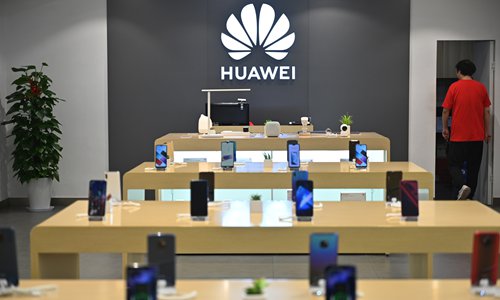HOME >> BUSINESS
FedEx apology fails to impress internet users
By Yang Sheng in Beijing and Chen Qingqing in Shenzhen Source:Global Times Published: 2019/5/28 23:36:27

Huawei smartphones are seen in a Huawei store in Shanghai on Sunday. Huawei's new flagship smartphone — the Honor 20 Pro — was launched in London on May 21. The smartphone is scheduled to be launched in Chinese mainland on Friday. Photo: AFP
Huawei is reviewing its partnership with FedEx after the Chinese tech company found two parcels destined for Asia were diverted to the US under suspicious circumstances.
FedEx has denied widespread speculation in China that the US delivery company was working with the Trump administration to interrupt Huawei's normal business activities, but Chinese experts said that to regain public trust, the US firm must provide a more detailed and responsible explanation.
The US firm diverted two packages from Japan, addressed to Huawei China, to the US, and attempted to divert two more packages from Vietnam to Huawei offices elsewhere in Asia - all without authorization - Reuters reported on Tuesday.
Huawei confirmed the report with the Global Times on Tuesday and a company spokesperson said that the packages, carrying important documents, were not delivered to their destinations.
"They were either diverted to, or were requested to be diverted to, FedEx in the US. This undermines our confidence," the Huawei spokesperson said.
This was no isolated incident, a Chinese electronics industry insider posted on China's Twitter-like Sina Weibo platform.
FedEx might work with the US following the Trump administration's sanctions on Huawei, the insider asserted.
An internet user with the pseudonym Moka, with more than 242,000 followers on Weibo, slammed FedEx China Thursday for confiscating chipset products delivered from a factory in the island of Taiwan to Huawei's office on the Chinese mainland.
An insider with close knowledge of the incidents told the Global Times on Tuesday that FedEx's behavior violates business cooperation principles and may also hurt its credibility.
"It's disgusting. An international express company is becoming a tool of the US government. It's surely a US firm," said the insider, who refused to be identified due to the sensitivity of the matter.
Later in the day, FedEx said on its official Sina Weibo account in response to the incident that "we value all of our customers who entrust more than 15 million packages a day with us."
"We regret that this isolated number of Huawei packages were inadvertently misrouted, and confirm that we were not requested by any external party to divert these packages which are in the process of being returned to the shippers," the company said.
Losing credibility
Net users on both Weibo and Twitter queried the FedEx statement.
"Errors only happened to Huawei among 15 million packages a day… interesting," commented a user.
"Isolated issue? All 4 packages were destined for Huawei. The FedEx business should be terminated in Asia," posted a user on Twitter.
"The package is from Japan to China, totally nothing to do with the US. Today they can divert Huawei's package. Tomorrow they can divert yours." tweeted another.
Shen Yi, head of Fudan University's Cyberspace Governance Research Institute, said that "the incident has left the Chinese public and firms with no choice but to suspect that FedEx is connected with US intelligence agencies."
Shao Zhonglin, former assistant secretary-general of the China Express Association, told the Global Times Tuesday that the doubts won't disappear if FedEx failed to provide details about how these packages, sent from Asian countries or regions and destined for the Chinese mainland, could be delivered to the US.
The core issue was how to deal with the abuse of power and address the consequences of this abuse, Fang Xingdong, founder of Beijing-based technology think tank ChinaLabs, told the Global Times on Tuesday.
"It's time to realize that when facing heavy political impact, enterprises are vulnerable. How to maintain a bottom line and boundaries are very important," he said. Sacrificing the interests of customers would likely disrupt the whole industry, Fang warned.
Dangerous trend
Earlier this month in a significant escalation of the trade war with China, the Trump administration barred American companies from selling to Huawei without a US government license.
Google followed the US government's sanctions by partially restricting Huawei access to its Android system, a move widely interpreted as yielding to government pressure.
Without providing evidence, the US government alleged that it could not rule out the possibility of Huawei sharing data with the Chinese government and harming US national security.
Google's actions revealed a double standard, said Shen Yi of Fudan University.
"The US is using its own mentality and reality to think about the relationship between governments and companies of other countries. Clearly US companies and the US government are working together," Shen said.
Fang noted that the US private sector, government and even the military have formed a complex "to act jointly."
"In the modern world of globalization, this kind of complex, with a long-arm jurisdiction approach, is very destructive" for countries and companies around the globe "if the complex extended its approach beyond the territory of the US," Fang said.
US enterprises would cooperate with the US government inappropriately as long as they didn't pay a price for it, Shen believed.
"If FedEx fails to make a clear and responsible explanation of the incident, China should identify it as an 'unsafe' foreign company, launch an investigation and issue lawful punishment if necessary."
If US firms pay a price for cooperating with the US government that interrupts normal business activities or involves spying on others, they will lobby the government to change policy, Shen noted.
Posted in: COMPANIES